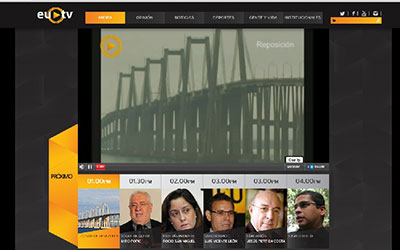With its low budget décor and grainy images, EUTV has the look and feel of small-town community television. But the Web-based TV station that went live on November 18 has much larger ambitions: It intends to be the primary source for Venezuelans who covet independent television news.
With the sale in April of Globovisión–the last remaining TV station critical of the country’s socialist government–to a business group allied with the government, hard-hitting TV news programming has become a rare commodity in Venezuela. That prompted the owners of the respected Caracas-based daily El Universal to speed up the launch El Universal Televisión, or EUTV, which they are promoting as a Web-based alternative for independent TV news.
EUTV was supposed to be rolled out in late 2014 “but the circumstances convinced us to accelerate the process,” Juan Aguerrevere, executive vice president of El Universal, told CPJ. With the sale of Globovisión “there is an important TV audience out there that has been orphaned. EUTV has the opportunity to fill that space.”
Located in the El Universal building in downtown Caracas, EUTV employs 30 people. It transmits about five hours of original daily programming, including three 15-minute newscasts. The lineup includes longer news analysis and interview programs.
Similar to El Universal and Globovisión, EUTV’s editorial line is skeptical of President Nicolas Maduro’s government. Although El Universal reporters do not work for the TV operation, a handful of prominent anchors and journalists from Globovisión, who were either fired or left the station after it toned down its coverage, have found a new home at EUTV.
“This is one of the few venues where you can freely express yourself,” said Victor Díaz, technical director of EUTV. By contrast, conventional TV stations–rather than digging into issues like high crime, galloping inflation, and government corruption–present Venezuela “as if it were Fantasy Island,” he said.
Still, EUTV faces huge challenges.
Around the world, only a handful of newspapers –the most prominent being The Wall Street Journal–have launched Web-based TV stations with regular programming as opposed to simply uploading occasional news videos to their Web sites. CBS News also intends to launch a 24-hour Web-based news service, according to reports.
In June, former presidential candidate Henrique Capriles, the leader of Venezuela’s political opposition, began hosting a weekly Internet news program on the capriles.tv website after complaining that conventional TV news programs were squeezing him out of their coverage.
It’s unclear whether traditional TV viewers will migrate to the Internet for full-fledged news programs. Online, style often trumps substance and people may lack the patience to sit through 15-minute newscasts. But perhaps the biggest obstacle is that Venezuela has one of the slowest download speeds in Latin America, which causes frequent delays in video streaming.
William Peña, editor of the Caracas newsletter Inside Telecom, told CPJ that average bandwidth in Venezuela is about 500 kilobytes per second. He said decent video streaming requires 2 megabytes per second, or about four times Venezuela’s average data transfer rate.
“At peak times, the Internet speed here is very slow,” a Caracas Internet executive told CPJ. “You want to see news that flows rather than stops and starts. I tried to watch EUTV the other day and couldn’t see anything.”
But Aguerrevere expressed confidence that bandwidth will gradually increase. Meanwhile, Roberto Giusti, a Globovisión veteran who now hosts the nightly “Con Visión” interview program on EUTV, predicted that viewers will put up with the glitches.
“Because free expression has been affected, it opens the possibility to do something here that might not be so attractive in another country where there is freedom of expression on traditional platforms,” Giusti said. “Here there is no other option so EUTV acquires a special importance.”
Aguerrevere compared doubts about Web TV to the late 1990s when newspapers were questioning whether readers would consume their news online. He also ticked off a number of advantages.
For starters, Web TV does not require a special transmission license from CONATEL, the government telecommunications regulator which has used hefty fines, the license renewal process, and other measures to pressure TV stations into pulling their punches, according to CPJ research. (Conatel has pressured Internet Service Providers to block Web pages it deems subversive–though not mainstream news sites.)
Internet TV is also portable: People can watch EUTV at the beach. In addition, more and more Venezuelans are migrating to the Internet – especially to social media like Twitter – to find independent news and analysis. With its connection to the 104-year-old El Universal newspaper, EUTV has instant credibility as a reliable news source, according to Marianela Balbi, executive director of the Caracas-based Institute for Press and Society or IPYS.
Balbi also sees the launch of EUTV as a potentially smart business decision. Amid inflation, government currency controls, shortages of newsprint, and the nationalization of private businesses that once advertised in the newspaper, El Universal faces a tough economic environment. Balbi described EUTV is a low-cost operation that could help the parent company maintain its independent editorial line and provide a new venue for advertisers.
